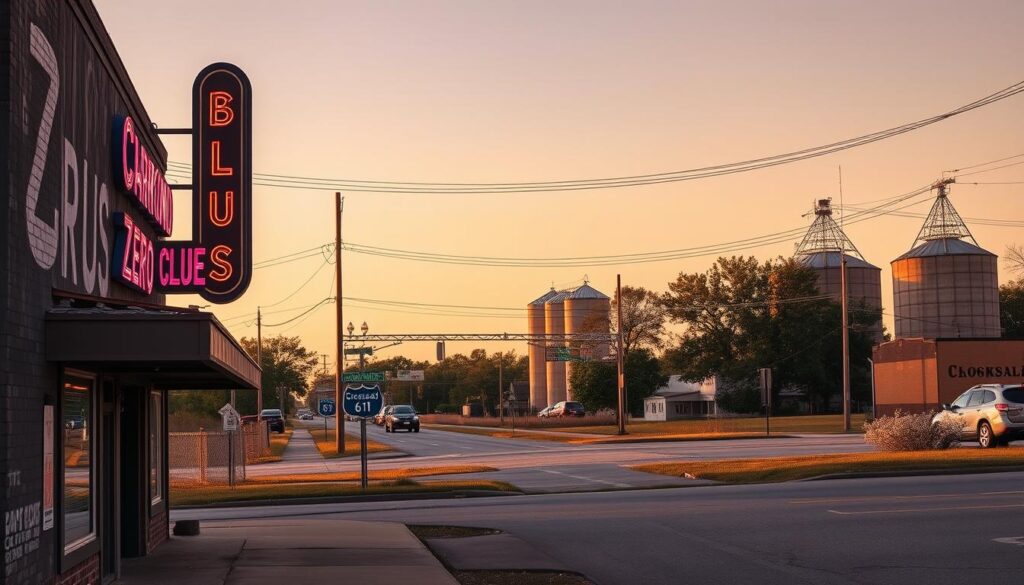The Mississippi Delta remains celebrated throughout the world as the original source of blues music origins. The area which embodies its abundant cultural past emerged into a musical sound that continues to inspire numerous generations of musicians internationally. Dockery Farms operated as an independent community which motivated numerous blues legends including Charley Patton to emerge.
The blues originated from the experiences both positive and negative which occurred among Delta residents throughout history. Dockery Farms operated as an artistic community that allowed musicians to express their life experiences through blues melodies. The different circumstances found in this distinctive environment created both the foundation and style for blues music which became essential to American cultural heritage.
The following article guides readers through major sites and telling narratives that make up the Mississippi Delta. Through this article readers will learn about the blues pioneers and how the Mississippi region established its enduring cultural footprint by creating music that speaks to all emotions and styles of human strength.
Key Takeaways
- The blues originated in the Mississippi Delta region that people recognize as its source.
- At Dockery Farms the development of blues culture during its early stages took place.
- Charley Patton and additional legendary musicians would become famous from this geographic region.
- The blues protoplast from difficult yet culturally abundant surroundings.
- The piece investigates both landmarks and stories and delves into the musical heritage of the area.
Discover Music Trails of the Mississippi Delta: Birthplace of the Blues
Music history resides as a precious collection throughout the Mississippi Delta territory. The historical legacy of the region created the blues which has inspired numerous musicians throughout the world. About 200 markers on the Mississippi Blues Trail recognize the essential role of this region for establishing the iconic blues musical style.
Understanding the Delta’s Musical Heritage
The music traditions of the Delta emerged as an offspring of its historical development. Early blues musicians employed their musical compositions to document both challenges and achievements that residents in the region experienced. The original emotional musical style grew into what would become known as blues music.
These informal venues played an essential role in spreading the cultural movement of the Delta area. At these unofficial meeting venues musicians exchanged their art as they frequently produced unplanned inventive musical performances. The Mississippi Blues Trail maintains the enduring tales about these historic places of music.
The Blues roots extend their history backward.
The blues history acknowledges Robert Johnson as one its most significant figures. The legendary contributions made by Robert Johnson toward the genre success are showcased on the Mississippi Blues Trail. The musical expressions that Robert Johnson created distilled Delta blues authenticity through an emotional and rhythmic combination.
The blues trail markers offer opportunities to see into historic periods. The markers show significant locations which include recording studios together with performance places that influenced blues development. These visual markers serve the important purpose of preserving historical records about pioneer blues artists.
Dockery Farms performed as a cultural center which enabled Charley Patton among other legendary musicians to develop their musical abilities. Dockery Farms functioned as more than a traditional farming operation since it became the birthplace of valuable creative expressions. The site attracted musical performers who exchanged traditions through songs that eventually fashioned the blues genre.
The cultural impact of Patton on blues music advancement cannot be denied. His unpolished musical approach motivated endless generations of musical artists. Getting to Dockery Farms delivers visitors to a bygone era that maintains deep blues heritage.
Check out the areas that brought forth legendary blues characters in their original birthplaces. The sites function both as sites with historical value while also serving as vital access to understand the development of blues music.
Mississippi Blues Trail Markers and Their Stories
Across Mississippi there are almost 200 markers which form part of the Mississippi Blues Trail. The markers use their displayed narratives to pay tribute to central figures and landmark settings of the blues heritage. The markers represent recording studios along with performance venues that maintain the heritage of blues music.
An educational exploration of the trail occurs during trip planning activities. The sites which spawned the legacies of Robert Johnson and Howlin’ Wolf will be among the locations you visit. These markers demonstrate the long-lasting combination of blues heritage on American culture.
Iconic Juke Joints and Local Venues
The blues scene’s epicenter lay in jukes. Musicians would use these unregulated venues to demonstrate their skills and create vibrant energies between them and their audience. Visitors find it a pleasure to experience the landmark status of Blue Front Cafe even today.
The venues provided settings for musicians to deliver their performances above their typical purpose. The blues lived on as a vibrant spirit among these places that served as important community centers. Musicians adopted the guitar as their expression tool which brought distinct sounds to Delta blues music.
Visitors to these sites expose themselves to the original threads that connect the fabric of culture in the state. These sites foster understanding of the blues heritage along with the musical inventiveness that blues music has manifested into contemporary musical creation.
Iconic Blues Musicians and Their Enduring Legacy
Their music reveals stories about fighting and surviving and harboring spirit. The musical artists demonstrate how powerful music can be through their life stories. The blues icons started from basic origins to achieve worldwide recognition within the musical world.
Charley Patton and the Pioneering Era
The honor of founding Delta blues belongs to Charley Patton according to many music historians. During the initial stages of blues music he developed a distinctive emotional musical approach which evolved into the foundation of this genre. Despite all the challenges Patton faced throughout his life his music became an inspirational voice for people who battled daily.
During 1929 he became famous through his recordings that established himself as one of the most important Delta blues creators. The recordings included delta blue elements by combining narrative elements with heartfelt melodies. Songs by Patton remain influential as they affect musical artists in the present.
Blues music performed its most important role in the world of juke joints. Through these venues musicians found a place to present their musical skills to smaller audiences. The authentic musical expression of delta blue melody established its roots in these musical establishments leading to the evolution of the genre.
The musicians demonstrated the authentic Delta feeling through their tunes which narrated both painful realities and inspirational aspects of life. Their musical legacy exists today because it continues to drive fresh musical talents who safeguard the blues genre.
| Marker Location | Significance |
|---|---|
| Dockery Farms | Birthplace of Delta blues, home to Charley Patton. |
| Crossroads | Legendary site tied to Robert Johnson’s myth. |
| Po’ Monkey’s Lounge | Iconic juke joint preserving Delta blues culture. |

Conclusion
The Mississippi Delta establishes itself through its permanent cultural heritage. During the past hundred years the region has become the birthplace of an ongoing musical transformation which drives inspiration into the present day. Every landmark across the fertile Dockery Farms lands and Mississippi River markers narrates how people found strength while creating new things.
At blues museums together with historic joints visitors can find the original beginnings of this music genre. The sites function beyond space designations because they represent an enduring cultural myth that defined American civilization. One may experience a temporal fusion by taking a journey through the Delta because past and current times unite harmoniously there.
This storied region displays a living legacy that arises from the union between history culture and musical sound which continues to shape itself presently. This region exerts wider influence across society while its cultural narrative extends from its original boundaries.
| Musician | Key Contribution | Notable Year |
|---|---|---|
| Charley Patton | Pioneered Delta blues style | 1929 |
| Howlin’ Wolf | Brought blues to a wider audience | 1951 |
| Robert Johnson | Defined the Delta blues sound | 1936 |
FAQ
Historians identify the Mississippi Delta region as the central place in blues history?
The music of the blues began in the Mississippi Delta because its cultural heritage developed into what is now known as a blues hotspot. Early blues music and two blues legends arose in this region where Charley Patton and Robert Johnson developed their styles.
The Mississippi Blues Trail markers represent significant points that mark locations with blues connections throughout the state?
The state of Mississippi displays historic signs known as Mississippi Blues Trail markers throughout its territory. The markers showcase essential places and folklore about blues culture development alongside stories about famous blues musicians throughout history.
Dockery Farms holds outstanding significance to blues music history for what reason?
The site located in the Delta region operates as the essential location where early Delta blues developed. In the early twentieth century Charley Patton together with other musicians created musical traditions at this venue.
A list of important blues musicians who came from the Mississippi Delta region begins with whom?
Robert Johnson together with Charley Patton and Howlin’ Wolf brought fame from the Mississippi Delta region. Their game-changing musical creation became the groundwork for contemporary blues music along with others which evolved into rock music.
Juke joints functioned as what played in the development of blues culture?
The musical community gathered at Juke joints while musicians performed in order to bring people from different parts of town together. The raw emotional feel of blues music reached more audiences through these music establishments as they became its major distributors and preservers.
What are my options to investigate the blues heritage of the Mississippi Delta during present times?
Visitor attractions include the historic Dockery Farms alongside the Mississippi Blues Trail markers and visitors can see live music performances at the Blue Front Café.



